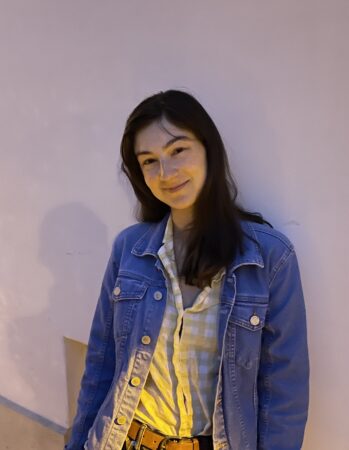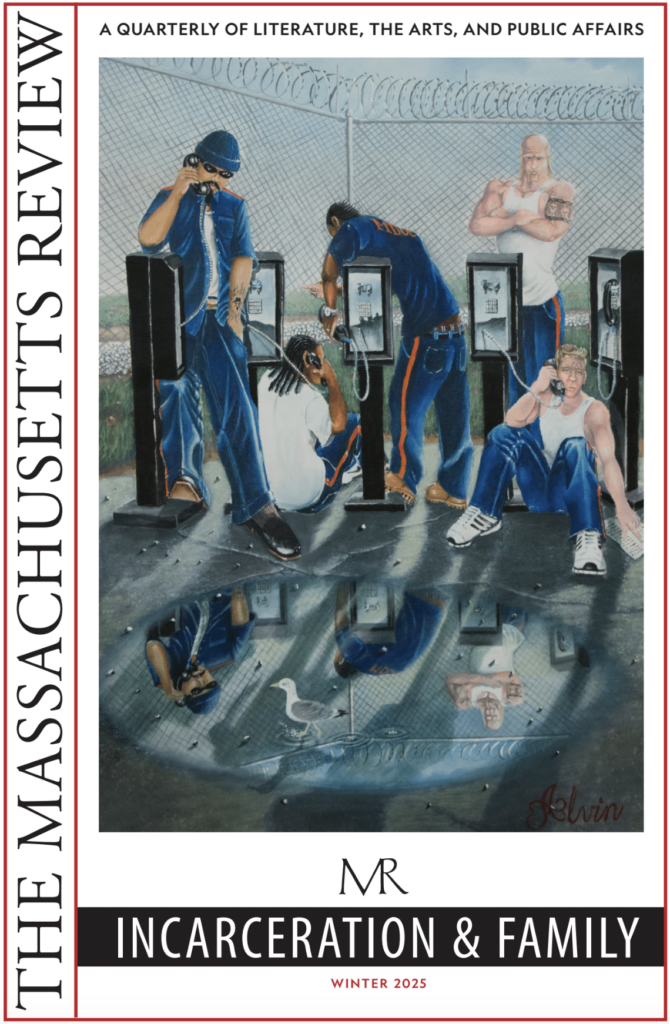10 Questions for Ariel Katz

For several years in her twenties, Ruth lived with a man who did not believe in happiness. When she thought of Edwin later, she remembered him in motion: pacing the uneven floors of their studio apartment, slamming cabinet doors, frying eggs, spattering oil. Always espousing various theories of living, his red hair meringue-like above a densely freckled face.
—from Ariel Katz’s “Organizing Principle,” Volume 66, Issue 2 (Summer 2025)
Tell us about one of the first pieces you wrote.
When I was twenty-two, I moved to San Francisco from the east coast without much of a firm plan; I think fondly of a story I wrote during that uncertain time. I’d always written and just knew I wanted to keep going. I found an internship at a literary magazine and a job at a café: after my shifts I hung out there and drafted this story. I felt like a failure compared to my college friends who were making lots of money in tech. But the story I wrote after my shifts ended up getting me into MFA programs; eventually it became my first fiction publication. More importantly, by writing it, I began to develop some of the interests and obsessions I still grapple with: how does grief shape us? How do we narrate our lives? How does our relationship to the past—individual, familial, historical—impact our experience of the present? Working on that story sometimes felt insignificant, but it ended up changing my life in significant ways.
What writer(s) or works have influenced the way you write now?
I’m always impressed by the emotional precision of Tessa Hadley’s fiction. Some contemporary short story writers I admire include Cynthia Ozick, Danielle Evans, Lorrie Moore, and Miranda July. I love stories that traverse huge spans of time in just a few pages. Playfulness and humor are also important to me as a reader and when I’m writing.
What other professions have you worked in?
I’ve tutored and taught; I worked in a cafe, where I was often accidentally breaking plateware and the like. Briefly I worked at a gift shop, surrounded by expensive potted plants, scented candles, and a tough store cat named Muffin who would hang out with me behind the register.
What did you want to be when you were young?
As a kid, I wanted to be a paleontologist. I’ve lost my encyclopedic knowledge of dinosaur types, but maintained my obsession with long-gone eras. And I still think fossils are cool 🙂
What inspired you to write this piece?
In “Organizing Principle,” I was interested in exploring relationships between characters who at first appear peripheral to one another. I’m drawn to fleeting encounters that stay with characters—small, weird interactions that hang around in memory. I’m interested in characters who become important to each other despite—or perhaps because of—their lack of centrality in one another’s present-day lives.
This story also is about the past re-emerging in the present. The protagonist is looking back in time during a transitional phase. She’s trying to figure out how she got where she is. The pleasures & distortions of memory always fascinate me.
Is there a city or place, real or imagined, that influences your writing?
I grew up in North Carolina; I haven’t lived there in years, but its landscape remains important to my writing. I’ve lived in a lot of different places since; each one seems to eventually find its way into my stories. California, where I lived for a couple of years, found its way into “Organizing Principle.” Queens is another setting in the story, and one that recurs in my fiction. I’m influenced by a sense of not being particularly rooted anywhere, and of being a newcomer to many of the places I’ve lived—seeing them through a newcomer’s eyes.
Is there any specific music that aids you through the writing or editing process?
While I’m actively writing or revising, I need quiet. But recently, when I’m en route to coffee shops to write, I’ve been on a Velvet Underground kick for some reason.
Do you have any rituals or traditions that you do in order to write?
I seem to write best mid-morning; an important part of my pre-writing routine is playing fetch with my one-year-old cat. (Or, a cat’s version of fetch, in which I end up running after the toy about as often as she does). She, unlike me, is at her most energetic and talkative in the morning. I try to vicariously absorb some of her verve and playfulness before I head to my desk.
If you could work in another art form what would it be?
I’ve always been fascinated by dance and photography. Each is embodied in ways that writing isn’t; each has compelling social components that writing doesn’t. There’s a vivid immediacy to both the performing and visual arts, whereas writing can be solitary and removed, both from its subject matter and its audience.
What are you reading right now?
I’m making my way through a PhD, and so this summer I’m reading a big stack of nineteenth century novels in preparation for my doctoral exams. Stuff like Charlotte Brontë’s Villette, Jane Austen’s Northanger Abbey, Mary Shelley’s Frankenstein, plus Dickens, Eliot, Dostoevsky, etc. It’s a great way to spend time with novels I should’ve read but haven’t. I also recently enjoyed Go, Went, Gone by Jenny Erpenbeck, A Woman’s Story by Annie Ernaux, and my friend Sanjena Sathian’s novel Goddess Complex, which came out this spring.
ARIEL KATZ’s fiction has appeared or is forthcoming in the Sewanee Review, Missouri Review, Threepenny Review, and elsewhere. She holds an MFA from the Iowa Writers’ Workshop and is pursuing a PhD in literature & creative writing at the University of Houston. She’s at work on a novel and a collection of stories.



